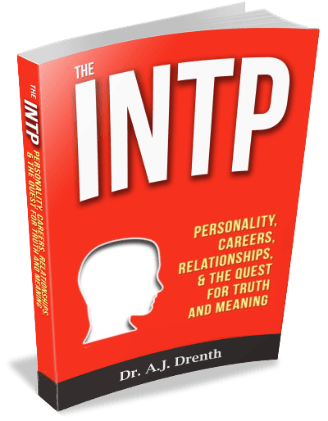
For each personality type, personal growth is a process of integrating the less conscious functions (i.e., the tertiary and inferior) with the more conscious functions (i.e., the dominant and auxiliary). In the post, Integrating the Inferior Function, I provide an introduction and overview of this process, which is intended for general application by all types.
In this post, we will explore additional personal growth issues that relate more specifically to INTPs. It assumes a working knowledge of INTPs’ inferior function, Extraverted Feeling (Fe).
As I’ve written elsewhere, integrating the inferior is more about enhancing the conditions for functioning authentically according to one’s type than about directly developing or “improving” the inferior function. In doing so, many inferior-related issues will take care of themselves; they are resolved indirectly. We will now explore ways INTPs can prepare the grounds for the integration of their Fe.
Overcoming Disillusionment & Questing for Truth
The inferior function can be understood to represent the ultimate goal or attractor point of personal growth. It is what motivates and draws us forward. For INTPs, this attractor point is the promise of convergent truth. This is deftly illustrated in Elaine Schallock’s notion of the Maze Metaphor. According to Schallock, INTPs’ journey toward truth, which is also synonymous with their journey toward their inferior function, can be likened to the process of blindly working one’s way through a hedge or corn maze. INTPs start at a given point (Ti) and then proceed to spend a great deal of time exploring and exhausting all possible paths and options (Ne). Again, the goal of the maze is the final function of their stack (Fe), which represents a point of convergent truth and wholeness for INTPs. This may involve discovering the right theory, career niche, or relationship. INTPs feel that if they could only find their proper role in life’s theater (i.e., their Fe) that everything else would naturally fall into place. Many INTPs dream of being engaged in theoretical work (Ti/Ne) that will ultimately prove beneficial to humanity (Fe).
Unfortunately, for various reasons, many INTPs come to abandon this dream, supplanting their interest in finding convergent truth with a position of absolute skepticism or relativism. So rather than working as theorists, they function exclusively as skeptics and naysayers. Wielding the sword of cynicism in nearly every facet of life, they spiral into an ever-bleaker worldview. They may reason that if there are no feasible solutions to the world’s problems, no answers to the big questions, then what is the point of doing anything? Why even bother?
While absolute skepticism may feel somewhat natural to INTPs’ top two functions, it often stifles their type development, which requires an integration of all the functions in their stack. Chronic depression is a keynote sign that something is amiss in INTPs’ development. In many cases, their depression can be traced back to a repression of the desire of the inferior function, of their need to work toward convergent truth.
Fortunately, a life of nihilism or cynicism is not an inevitable endpoint for INTPs. While INTPs may find reasons to be dismay of the world, they needn’t give up on their own quest for truth and personal growth. In many cases, if INTPs carefully trace how they arrived at a point of absolute nihilism or cynicism, they can see that it was not an entirely rational process. In most cases, INTPs are too quick to give up on themselves or their search for truth. They fail to realize that, as the Maze Metaphor illustrates, part of being an INTP requires eliminating all that is not true before being able to confidently assert what is true. Once INTPs realize that leaping to extreme of relativism or nihilism was not an entirely rational act and is not their only option, they can gradually work their way back to meaning, including rediscovering the joy the stems from learning, creating, and searching for convergent truth.
Desire to Enlighten Others
In striving toward their inferior Fe, INTPs are compelled to discover knowledge or wisdom they can use to enlighten the world. However, because their extraverted Judging function (Fe) is inferior, INTPs often struggle when it comes to directly expressing their judgments. They are generally more comfortable exchanging ideas by way of their auxiliary Ne than they are in delivering Fe monologues.
INTPs can also become impatient with those who are slow to understand or embrace their ideas, preferring that others learn as quickly and independently as they do. Moreover, they often lack motivation to invest significant time or energy in helping or teaching individuals. They would much rather work toward discovering and organizing information that others can learn and apply independently.
For these reasons, INTPs are often ill-suited for teaching, counseling, and other careers in human services or the helping professions. While their Fe may tempt them with the romantic ideal of helping others through teaching or therapy, INTPs are usually happier when sharing their insights less directly, such as through writing.
Desire for Acclaim / Affirmation
As I’ve discussed elsewhere, Fe confers a strong desire for interpersonal affirmation and validation. While FJs tend to feel affirmed and validated in their routine interactions with people, INTPs have more difficulty connecting with others on the wavelength of feeling. Since their Fe is inferior, INTPs’ desire for affirmation can be more childlike and grandiose. They may be unsatisfied with a handful of others acknowledging their intelligence, but often desire something more. They may dream of doing something grand, something big, something that would bring them widespread affirmation.
While dreams and ambitions are not inherently bad, pursuing grandiose ideals is rarely in INTP’s best interests. As I’ve described elsewhere, this can lead them to rush through their work, devalue their relationships, and prevent them from savoring the journey of life. INTPs who are in a mad rush to prove themselves or produce something grandiose will invariably produce work of questionable quality, making it unlikely they will earn the affirmation they are seeking. They are better off taking their time, focusing on mastery and precision, both of which come quite naturally to their Ti. Rather than trying to create something entirely new (e.g., a new “theory of everything”) with hopes of being recognized as an ingenious creator, INTPs are generally better suited for refining (Ti) or expanding upon (Ne) existing theories. While rarely leading to quick fame, this approach allows INTPs to work more slowly and carefully (as T-dominants should), without a constant sense of time pressure. Only by working in this fashion will INTPs produce high-quality work that will stand the test of time. Both Darwin and Kant are good examples of theorists who displayed tremendous patience and methodicalness, delaying the publishing of their seminal works until later in life.
Lifestyle
To pave the way for personal growth and authentic living, INTPs also need to think carefully about their lifestyle. They might consider, for instance, whether they are comfortable with others being financially dependent on them. After all, it can be difficult for INTPs to work optimally (as just described) when feeling the pressure of supporting others financially. This is especially true for INTPs who are still working to find themselves and their niche.
Of course, eschewing relational commitments that might beget financial obligations can be difficult for INTPs, due to the influence of their Fe inferior. However, I strongly believe that it is better for INTPs, as T-dominants, to focus on developing their career before committing to a long-term relationship. In many ways, work satisfaction is a precursor to their ability to function optimally in a relationship. Although many INTPs will not reach this point until well into their thirties or forties, if they remain patient, most can find a satisfying niche (see my INTP careers page).
INTP Relationships
Once INTPs have acquired sufficient self-knowledge, career satisfaction, and interpersonal wisdom, they might consider the prospect of a long-term relationship. Relationships can serve a wonderful context for INTPs to experience the full integration of their Fe. The primary challenge, of course, is finding the right person.
In my post on INTP relationships, I discuss the importance of INTPs choosing a mate according to the desires, values, and needs of their top two functions rather than those of their inferior. When INTPs pair with a partner who shares similar intellectual or psychospiritual interests, they can more easily satisfy their Fe in a healthy and sustainable way. If paired with an incompatible type, their relationship often ends up functioning as a mere crutch for their inferior, while they go about drowning themselves in their own independent projects.
Learn More in Our INTP Book:
Learn more about INTPs—their personality, careers, relationships, cognition, life struggles, and more—in our INTP book (the #1 INTP book on Amazon with over 300 reviews):
The INTP: Personality, Careers, Relationships and the Quest for Truth & Meaning
#1 INTP Book
on Amazon

#1 INTP Book
on Amazon!
Related Posts:
Integrating the Inferior Function
